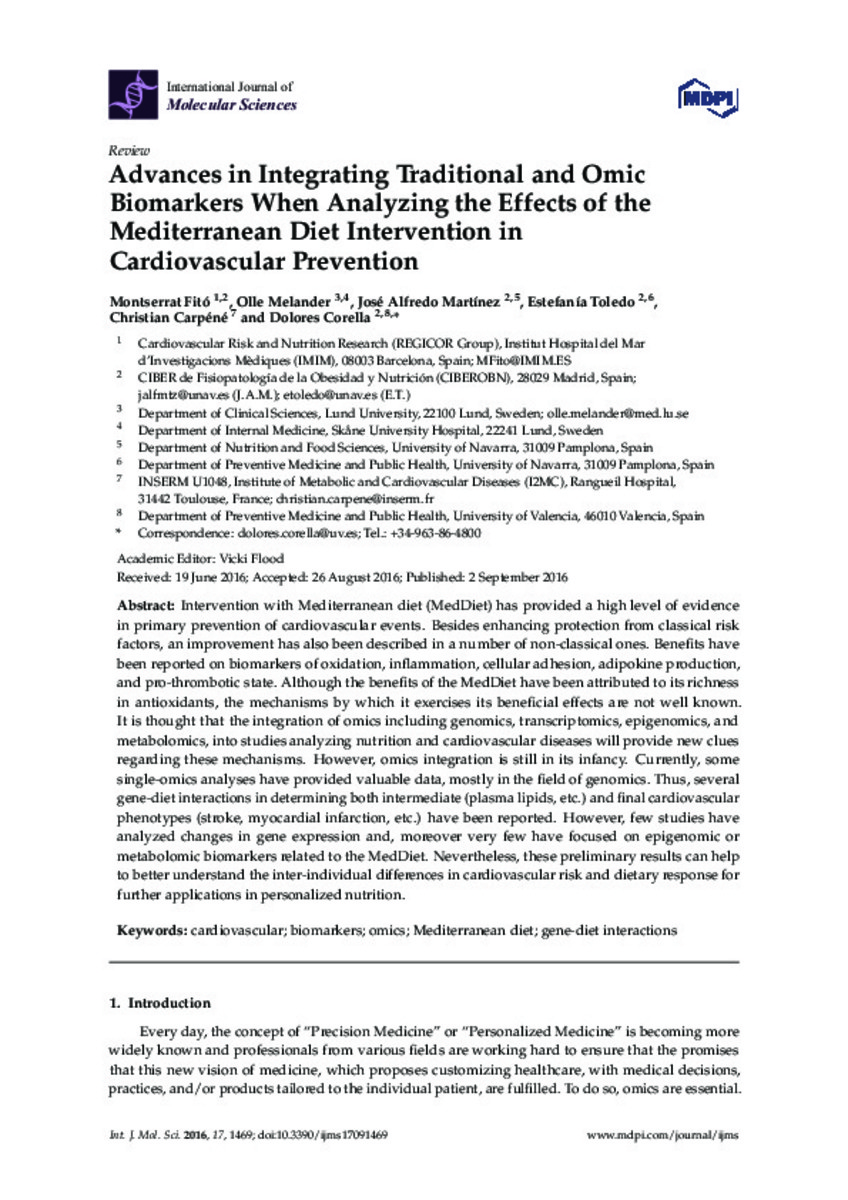Full metadata record
| DC Field | Value | Language |
|---|---|---|
| dc.creator | Fito, M. (Montserrat) | - |
| dc.creator | Melander, O. (Olle) | - |
| dc.creator | Martinez, J.A. (José Alfredo) | - |
| dc.creator | Toledo, E. (Estefanía) | - |
| dc.creator | Carpene, C. (Christian) | - |
| dc.creator | Corella, D. (Dolores) | - |
| dc.date.accessioned | 2017-04-05T09:12:30Z | - |
| dc.date.available | 2017-04-05T09:12:30Z | - |
| dc.date.issued | 2016 | - |
| dc.identifier.citation | Fito M, Melander O, Martinez JA, Toledo E, Carpene C, Corella D. Advances in Integrating Traditional and Omic Biomarkers When Analyzing the Effects of the Mediterranean Diet Intervention in Cardiovascular Prevention. Int. J. Mol. Sci. 2016;17:1-20. | es_ES |
| dc.identifier.issn | 1661-6596 | - |
| dc.identifier.uri | https://hdl.handle.net/10171/43223 | - |
| dc.description.abstract | Abstract: Intervention with Mediterranean diet (MedDiet) has provided a high level of evidence in primary prevention of cardiovascular events. Besides enhancing protection from classical risk factors, an improvement has also been described in a number of non-classical ones. Benefits have been reported on biomarkers of oxidation, inflammation, cellular adhesion, adipokine production, and pro-thrombotic state. Although the benefits of the MedDiet have been attributed to its richness in antioxidants, the mechanisms by which it exercises its beneficial effects are not well known. It is thought that the integration of omics including genomics, transcriptomics, epigenomics, and metabolomics, into studies analyzing nutrition and cardiovascular diseases will provide new clues regarding these mechanisms. However, omics integration is still in its infancy. Currently, some single-omics analyses have provided valuable data, mostly in the field of genomics. Thus, several gene-diet interactions in determining both intermediate (plasma lipids, etc.) and final cardiovascular phenotypes (stroke, myocardial infarction, etc.) have been reported. However, few studies have analyzed changes in gene expression and, moreover very few have focused on epigenomic or metabolomic biomarkers related to the MedDiet. Nevertheless, these preliminary results can help to better understand the inter-individual differences in cardiovascular risk and dietary response for further applications in personalized nutrition. | es_ES |
| dc.description.sponsorship | This study has been supported by The Spanish Ministry of Economy and Innovation and the Fondo Europeo de Desarrollo Regional (projects CIBER 06/03, CNIC-06, PI11/02505, AGL2010-22319-C03-03, AGL2009-13517-C03-01, and PI13/00728), by the Real Colegio Complutense at Harvard (Harvard University, MA, USA), by Miguel Servet’s contract (CP06/00100), the AGAUR (2014-SGR-240), and the European Commission (QLRT-2001-00287). CIBER de Fisiopatología de la Obesidad y Nutrición (CIBEROBN) is an initiative of the Instituto de Salud Carlos III, Madrid, Spain and by Fundación MAPFRE-Larramendy. | es_ES |
| dc.language.iso | eng | es_ES |
| dc.publisher | MDPI | es_ES |
| dc.rights | info:eu-repo/semantics/openAccess | es_ES |
| dc.subject | Cardiovascular | es_ES |
| dc.subject | Biomarkers | es_ES |
| dc.subject | Omics | es_ES |
| dc.subject | Mediterranean diet | es_ES |
| dc.subject | Gene-diet interactions | es_ES |
| dc.subject | Materias Investigacion::Ciencias de la Salud::Medicina preventiva | es_ES |
| dc.title | Advances in Integrating Traditional and Omic Biomarkers When Analyzing the Effects of the Mediterranean Diet Intervention in Cardiovascular Prevention | es_ES |
| dc.type | info:eu-repo/semantics/article | es_ES |
| dc.identifier.doi | http://dx.doi.org/10.3390/ijms17091469 | es_ES |
Files in This Item:
Statistics and impact
Items in Dadun are protected by copyright, with all rights reserved, unless otherwise indicated.






